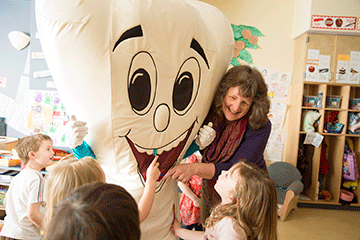
09/01/2015
Barry Batzing believes SUNY Cortland has a healthy relationship with Cortland County. And he means that literally.
Batzing himself is an example. After retiring as a SUNY Cortland biological sciences professor six years ago, Batzing became president of the Cortland County Board of Health, moving through a busy pipeline of people and information between the College and the county’s Health Department.
SUNY Cortland sends student interns into the community, brings county health educators and their expertise to campus, and turns its own talented graduates — some of whom Batzing once taught — into community experts.
Many of the Cortland County Health Department’s approximately 50 employees have ties to the College as alumni, adjunct instructors or project collaborators, according to Batzing. Their work is represented across five divisions of the department: health education, nursing, the Jacobus Center for Reproductive Health, children with special needs and environmental health, which can include everything from food inspection to treating illness.
“There have been a number of connections between the two groups, and I think it’s great the county is using the expertise of the College and vice versa,” the professor emeritus said. “It means talented people who care about local health and safety are working together and sticking around the area.”
Two good examples of that are community health educators ReBecca Canzano ’02 and Jennifer Hamilton ’00. Both grew up in Cortland, earned associate’s degrees from Tompkins Cortland Community College and bachelor’s degrees from SUNY Cortland, and landed in full-time positions for the county’s Health Department. Both also described Batzing’s microbiology course as one of the most memorable from their undergraduate days.
Canzano oversees health education as well as the Cortland County Youth Bureau. Hamilton primarily coordinates the Tobacco-Free Cortland Program. Their office’s other projects are focused on traffic and bicycle safety, cancer screenings for the underinsured, obesity prevention, teenage leadership development and household safety.
 |
| Jennifer Hamilton ’00 and ReBecca Canzano ’02 |
“Our work touches every population,” Canzano said.
Their efforts also receive a boost from SUNY Cortland student interns pursuing majors such as health education, community health or sociology. Typically, up to two health education interns each semester will take over an existing project or develop a new program. Examples have included Teen Driving Week for local high schools and an eight-week healthy living program for teenage girls titled Ways to Enhance Children’s Activity and Nutrition (WE CAN).
“The interns have been wonderful,” Canzano said. “They’re great at offering new ideas or new approaches to things.”
Hamilton joined the county’s Health Department as a student intern herself 15 years ago. She knew the department as the authority tasked with restaurant inspections, but knew little else about the breadth of the department’s work. She quickly discovered a meaningful profession that often takes her into the community where she grew up. It’s even brought her back to work with her alma mater, where she consulted with SUNY Cortland’s Tobacco-free Advisory Committee when the campus rolled out a tobacco-free policy in 2013.
The work that she started as an intern hasn’t ceased.
“I would say both ReBecca and I — having grown up here — have this desire to make the community as best it can be and as healthy as it can be,” Hamilton said. “We both have kids and want to see it for them too.”
Batzing, who was a SUNY Cortland faculty member for 36 years, replaced late Distinguished Service Professor Emeritus Charles N. Poskanzer when he began serving on the Board of Health in 2000. As board president, he oversees the work of the county’s Health Department. He said he continues to grow more impressed with time.
“I’m always amazed at how well our graduates do,” Batzing said. “It’s one thing to see them as students and then see them as the professionals out there.
“Now, I’m looking to them for the expertise. They’re not looking to me anymore.”
Impressive results take time to develop, whether they’re tied to a breakthrough tobacco policy or a leadership program for children, Canzano said. They rely heavily on collaborative work between community partners such as the one that exists between the College and the county’s Health Department.
“We know how valuable the College is to us,” Canzano said. “And obviously, they keep asking us for help, so they appreciate the work we do.
“It’s a strong relationship.”